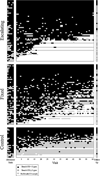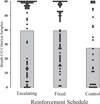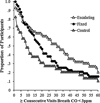The effects of fixed versus escalating reinforcement schedules on smoking abstinence
- PMID: 25640764
- PMCID: PMC4480608
- DOI: 10.1002/jaba.185
The effects of fixed versus escalating reinforcement schedules on smoking abstinence
Abstract
Studies indicate that when abstinence is initiated, escalating reinforcement schedules maintain continuous abstinence longer than fixed reinforcement schedules. However, these studies were conducted for shorter durations than most clinical trials and also resulted in larger reinforcer value for escalating participants during the 1st week of the experiment. We tested whether escalating reinforcement schedules maintained abstinence longer than fixed reinforcement schedules in a 12-week clinical trial. Smokers (146) were randomized to an escalating reinforcement schedule, a fixed reinforcement schedule, or a control condition. Escalating reinforcement participants received $5.00 for their first breath carbon monoxide (CO) sample <3 ppm, with a $0.50 increase for each consecutive sample. Fixed reinforcement participants received $19.75 for each breath CO sample <3 ppm. Control participants received payments only for delivering a breath CO sample. Similar proportions of escalating and fixed reinforcement participants met the breath CO criterion at least once. Escalating reinforcement participants maintained criterion breath CO levels longer than fixed reinforcement and control participants. Similar to previous short-term studies, escalating reinforcement schedules maintained longer durations of abstinence than fixed reinforcement schedules during a clinical trial.
Keywords: contingency management; differential reinforcement; nicotine; schedule of reinforcement; smoking cessation; tobacco.
© Society for the Experimental Analysis of Behavior.
Figures



References
-
- Budney AJ, Higgins ST, Radonovich KJ, Novy PL. Adding voucher-based incentives to coping skills and motivational enhancement improves outcomes during treatment for marijuana dependence. Journal of Consulting and Clinical Psychology. 2000;68:1051–1061. - PubMed
-
- Correia CJ, Benson TA. The use of contingency management to reduce cigarette smoking among college students. Experimental and Clinical Psychopharmacology. 2006;14:171–179. - PubMed
-
- Henningfield JE, Stitzer ML, Griffiths RR. Expired air carbon monoxide accumulation and elimination as a function of number of cigarettes smoked. Addictive Behaviors. 1980;5:265–272. - PubMed
Publication types
MeSH terms
Substances
Grants and funding
LinkOut - more resources
Full Text Sources
Other Literature Sources
Medical
Miscellaneous

